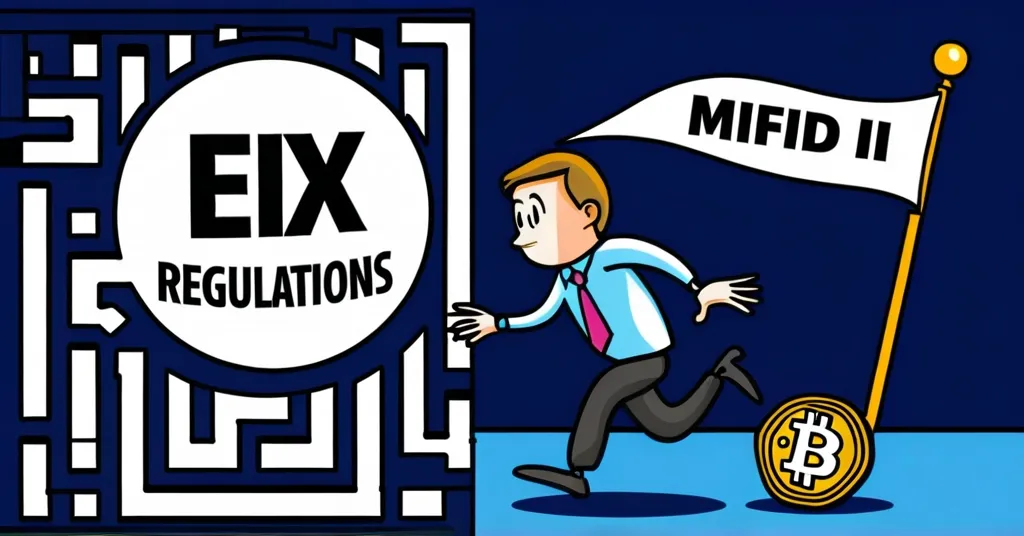OKX Gains EU MiFID II License, Boosts Crypto Derivatives Trading

OKX Secures MiFID II License for EU, Expanding Crypto Trading Options
OKX, a leading cryptocurrency exchange, has been granted a MiFID II license, allowing it to offer derivative products to European institutional clients. This milestone follows OKX’s pre-approval under the MiCA framework, showcasing its dedication to regulatory compliance within the European Union.
- MiFID II license enables derivatives for EU institutional clients
- First virtual financial assets exchange with MiCA pre-approval
- Offers OTC, spot, and bot trading for over 240 cryptocurrency tokens
The MiFID II (Markets in Financial Instruments Directive II) license, a regulatory framework governing financial markets in the EU, empowers OKX to expand its offerings. This includes over-the-counter (OTC) trading, where parties negotiate contracts directly, spot trading, which involves buying and selling cryptocurrencies at current market prices, and bot and copy trading for an extensive selection of over 240 cryptocurrency tokens. With the addition of derivatives, financial instruments deriving their value from underlying assets, OKX can now cater to the sophisticated needs of institutional investors within the European market.
Erald Ghoos, Europe CEO of OKX, underscored the importance of this regulatory achievement, stating,
“Our MiFID II license and the MiCA license spotlight our commitment to meeting the rigorous compliance standards demanded in Europe and to meeting the needs of the trading community.”
Ghoos added,
“With derivatives joining that list, institutional customers gain access to sophisticated and fully compliant trading products in their local market.”
Amidst these regulatory successes, OKX has also faced challenges related to its involvement in the aftermath of a $1.5 billion hack connected to Bybit. OKX clarified their stance on social media, stating,
“We want to clarify for our community that OKX is not being investigated.”
The exchange played a crucial role in assisting Bybit and regulators in tracking and blocking wallet addresses linked to the stolen funds, emphasizing their proactive approach to security and compliance.
The European Union’s drive for clearer regulations in the cryptocurrency space is evident with frameworks like MiFID II and MiCA, aiming to protect investors and ensure market stability. OKX’s licensing achievements are a strategic move to attract institutional investors who value regulatory assurance. OKX’s choice of Malta as its MiCA hub reflects the country’s robust regulatory environment and technological infrastructure. The exchange holds a Class 4 Virtual Financial Assets (VFA) license from the Malta Financial Services Authority (MFSA), supporting its operations in the region.
As OKX navigates the regulatory landscape, it remains a pioneer in offering localized crypto services across the European Economic Area (EEA). The concept of passporting under the MiCA framework will allow OKX to extend its services across all 30 EEA member states once a full MiCA license is obtained, simplifying trading and investing in digital assets for Europeans.
While OKX’s regulatory achievements are a step forward, we must remain vigilant about the ongoing challenges in the crypto space. As champions of decentralization, we see OKX’s regulatory achievements as a double-edged sword, balancing compliance with the ethos of crypto freedom. OKX navigating the regulatory maze? More like a crypto Columbus charting new territories!
However, the question arises: do these regulatory moves truly align with the crypto ethos of decentralization and freedom? While compliance is crucial for mainstream adoption, it might also constrain the innovative spirit that drives the crypto revolution. It’s a delicate balance between embracing regulation for growth and preserving the core principles that make cryptocurrencies unique.
OKX’s regulatory achievements set a precedent for other exchanges looking to operate within the EU’s regulatory framework. This move not only enhances OKX’s offerings but also contributes to the broader adoption and acceptance of cryptocurrencies in the region.
Key Takeaways and Questions
- What does the MiFID II license allow OKX to do in the EU?
The MiFID II license enables OKX to launch derivative products for European institutional clients and offer a wide range of regulated investment services across the European Union.
- How does the MiCA pre-approval impact OKX?
The MiCA pre-approval positions OKX as a trailblazer in regulatory compliance within the crypto space, allowing it to operate under the new EU framework for crypto assets.
- What trading services does OKX offer in Europe?
OKX offers OTC trading, spot trading, bot and copy trading for over 240 cryptocurrency tokens, now including derivatives, along with fiat-based pairs against the euro and local-language customer support.
- What was OKX’s role in the Bybit hack situation?
OKX assisted Bybit and regulators in tracking and blocking wallet addresses linked to the stolen funds, denying any wrongdoing or investigation against them.
- How does OKX’s regulatory achievement relate to its commitment to compliance?
OKX’s acquisition of the MiFID II license and MiCA pre-approval underscores its dedication to meeting Europe’s stringent compliance standards, ensuring it can effectively serve the trading community.



